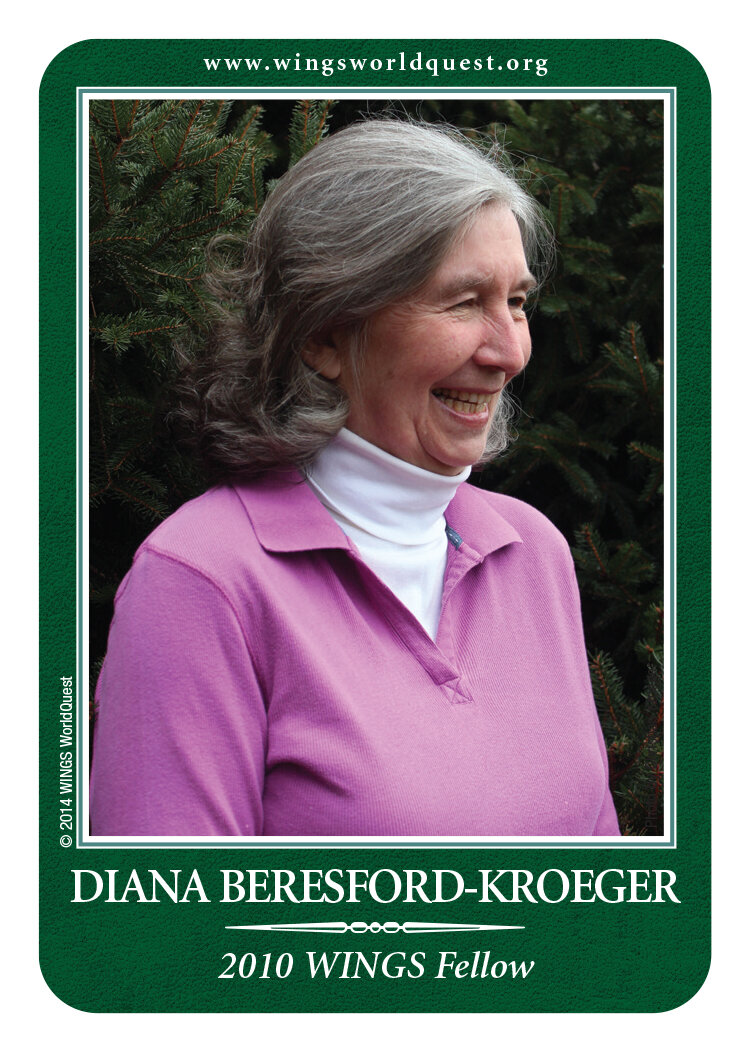Diana Beresford-Kroeger
Botanist, medical biochemist, author and filmmaker Dr. Diana Beresford-Kroeger has dedicated her life and career to understanding the underlying beauty, preservation and protection of rare and native trees. She has made it her mission to nurture and protect the global forests for future generations. Her work consists of trying to give ordinary people a new relationship with nature. In one of her speeches, she mentions how many doctors overuse antibiotics, and by using natural tree based medicines instead, the effectiveness increased by 100 percent. Diana was orphaned at a young age, which left her to be taught by her elders about the Brehon, which is the knowledge of plants and nature. This understanding of the ancient knowledge of trees has led her to unique scientific discoveries. In the 1970s Diana started her own arboretum and collected trees from all over the world. She discovered the importance of mother trees at the heart of the forest and she scientifically proved that trees are a living library of medicine that have a chemical language and communicate in a quantum world. She created an ambitious bioplan encouraging and educating ordinary people how to replant the global forest. This plan was adopted by the city of Ottawa.
Diana’s documentary, “Call of the Forest” was released in 2016 and alongside it was a tree-planting app “which keyed species to plant to the regions where people lived.” Early on in filming, Diana was introduced to activist Sophia Rabliauskas, leader of the Poplar River First Nations. Sophia had secured protected status for two million acres of virgin boreal forest on the eastern side of Lake Winnipeg, and was currently fighting to have the entirety of Pimachiowin Aki, a massive area of virgin boreal forest, declared a UNESCO World Heritage Site. The women teamed up and when their first application was rejected, Diana journeyed into the forest to prove the importance of its biodiversity by identifying plants that exist nowhere else. In August 2018, Pimachiowin Aki was named a UNESCO World Heritage and Cultural Site – the first to be recognized as having both cultural and environmental significance.
Diana also designed stroma-free hemoglobin, the hemoglobin which could be used in tissue transplantation. With advanced degrees in Botany, Chemistry and Medicine, she has always had an immense interest in developing a cure for cancer, but has, at the same time, made sure to maintain the connection between mind, body, and soul as she says that "the mind and soul are beginning to go astray." Diana Beresford-Kroeger has written many books, including "Global Forests: 40 Ways Trees Can Save Us," and her most recent book, "The Sweetness of a Simple Life." In 2011 she was named one of the Utne Reader’s World Visionaries. Later that year she was nominated as a fellow of the Royal Geographical Society. In 2016 she was named one of the 25 women explorers of Canada.
Diana’s legacy project is to clone and map the entire global forest. This process is similar to medicinal stem cell cloning where the DNA is preserved unchanged remaining in its native form. A living bank of tree seeds must be put together to either mend or amend what remains of our global forests. Creating a living library of the global forests will preserve the forests for generations to come.
Born: 1944
Hometown: Merrickville, Ontario Canada Education: Ph.D. in Biology Occupation: Botanist and medical biochemist Expeditions: Botanical explorations in Europe and North America
Favorite Place To Be: Gougane Barra, Ireland
Best Discoveries: Plants can change their chemistry to attract pollinators or repel predators. Pioneering research in cathodoluminescence.
Favorite Items In The Field: Good tea, lens, scalpel, collecting bags, and a folding shovel
Personal Hero: Archbishop Desmond Tutu
Hobbies: Theater and art
Books: To Speak for the Trees; The Sweetness of a Simple Life; The Global Forest; Arboretum Borealis; Arboretum America; Time Will Tell; A Garden for Life
Website: https://dianaberesford-kroeger.com/
Advice: Apply the virtue of simplicity

